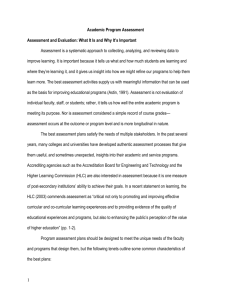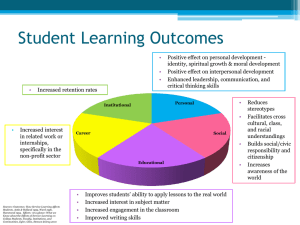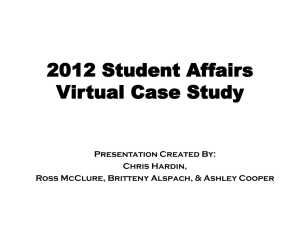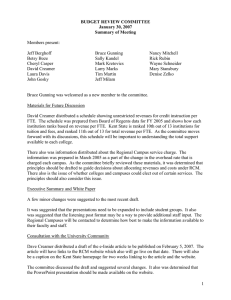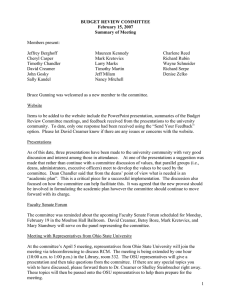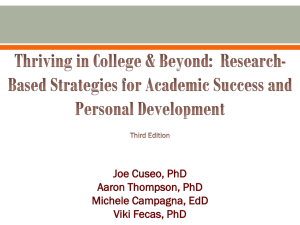Syllabus Instructor: Gwenn Pasco, Ed.D. Office Hours by appointment.
advertisement
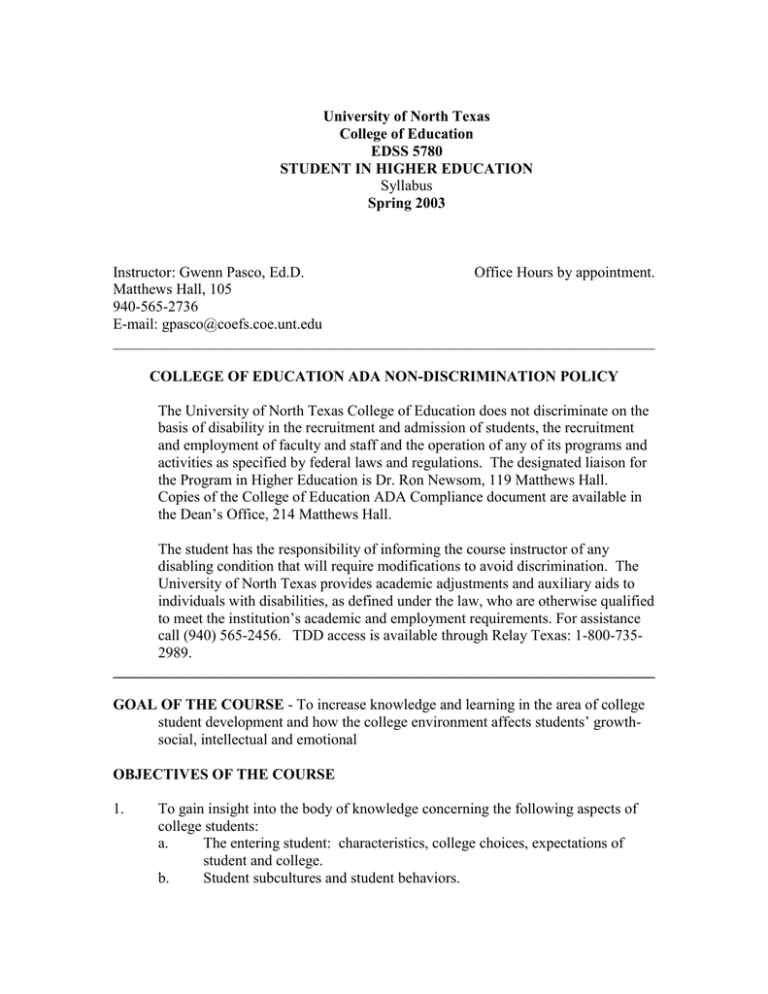
University of North Texas College of Education EDSS 5780 STUDENT IN HIGHER EDUCATION Syllabus Spring 2003 Instructor: Gwenn Pasco, Ed.D. Office Hours by appointment. Matthews Hall, 105 940-565-2736 E-mail: gpasco@coefs.coe.unt.edu ________________________________________________________________________ COLLEGE OF EDUCATION ADA NON-DISCRIMINATION POLICY The University of North Texas College of Education does not discriminate on the basis of disability in the recruitment and admission of students, the recruitment and employment of faculty and staff and the operation of any of its programs and activities as specified by federal laws and regulations. The designated liaison for the Program in Higher Education is Dr. Ron Newsom, 119 Matthews Hall. Copies of the College of Education ADA Compliance document are available in the Dean’s Office, 214 Matthews Hall. The student has the responsibility of informing the course instructor of any disabling condition that will require modifications to avoid discrimination. The University of North Texas provides academic adjustments and auxiliary aids to individuals with disabilities, as defined under the law, who are otherwise qualified to meet the institution’s academic and employment requirements. For assistance call (940) 565-2456. TDD access is available through Relay Texas: 1-800-7352989. ________________________________________________________________________ GOAL OF THE COURSE - To increase knowledge and learning in the area of college student development and how the college environment affects students’ growthsocial, intellectual and emotional OBJECTIVES OF THE COURSE 1. To gain insight into the body of knowledge concerning the following aspects of college students: a. The entering student: characteristics, college choices, expectations of student and college. b. Student subcultures and student behaviors. c. d. e. f. Student attitudes and values. Student objectives and needs. Student from diverse backgrounds Student development theories and practices. 2. To understand the impact of college programs and the college experience on student learning. 3. To be able to synthesize knowledge about college students, student development theories, college impact on students, and environmental factors that affect student learning. 4. To become familiar with current issues that affect the development and retention of students; including, but not limited to: a. b. c. d. e. f. g. h. i. j. Sexual harassment Campus dissent Sexual assault Other campus violence Racism and sexism Alcohol and drug abuse Intercollegiate athletics Fraternities and sororities Emotional stress Student rights and responsibilities 5. To become familiar with research literature concerning college students and to take a critical approach in evaluating its relevance to administration and teaching 6. To effectively communicate learning about the student in higher education 7. To be able to synthesize this learning to make informed administrative decisions to develop and recommend appropriate student affairs policies and programs TEXTS Astin, A. W. (1997). What matters in college. San Francisco, CA: Jossey-Bass, Inc. Creamer, D.G. & Associates (1990). College student development. Alexandria, VA: American College Personnel Association. COURSE REQUIREMENTS 1. Attendance and informed participation in class 2. Think piece on self as a professional 15 points 10 points 3. Research paper 4. Field experience 5. Research Paper Presentation 6. Final TOTAL 25 points 30 points 10 points 10 points 100 points 1. ATTENDANCE - If you cannot attend class, you are expected to notify the instructor prior to the class. Failure to attend class may result in a lowering of the final grade. 2. ARTICLE REVIEWS - Select a current article from a journal related to college student issues. Make one copy to turn in at the time you present. Present a brief overview of the article - why you selected it, what you know about the author, critique as to its relevance to your interests - (10 minutes maximum) Article reviews may be assigned periodically during the semester as part of class participation. 3. THINK PIECE - (3 pages) Address why you have selected to become a college counselor or student affairs professional. What factors from your background do you believe make you suitable for this profession? What areas provide a challenge for you? How would you describe the relationship to students of the ideal professional in your chosen field? 4. RESEARCH PAPER - (10 pages) Topics should focus on the college student and student affairs. All papers should be written in APA style (Publications Manual of the American Psychological Association, 4th edition, 1994). Papers should include at least seven references, four of which should be dated 1996 or later and are due May 6, 2002. 5. FIELD EXPERIENCE - You are required to spend 20 hours at an institution of higher education working with a college counselor or student affairs professional. You are expected to select the school and the person with whom you will be working, formulate a learning plan and discuss this plan with the instructor by February 4, 2002. Upon completion of the 20 hours, you will turn in a 5- page paper outlining your experience and your reflections on that experience. The reflection should include a reference to what you have learned about yourself as a continuance of your first paper. Also included in your paper should be at least two interviews- one with your contact person (one page),the other with a student on your chosen campus (one page) - and your response to those interviews. 6. INTERVIEWS should be part of the field experience paper and should include the following: a. b. c. d. e. f. Name of school Characteristics of the campus Student characteristics Internship possibilities Address, phone number and a contact person Who did you interview? - (PROFESSIONAL) Title? Education and degree? Responsibilities? Career goals? What do they see as job prospects for the field? - (STUDENT) Gender, ethnicity, year, major? Involvement? Career goals? What does s/he see as the major issues facing today’s students? g. Additional information as appropriate Interviews should be succinct and in outline form. 7. CLASS PRESENTATION – This is a formal presentation of your research paper. It should be conducted as you would a paper presentation at a professional conference. Points will be assigned as follows: Thoroughness of paper overview 6 points What interested you and why? 2 points How can this information impact higher education and student affairs? 2 points TOTAL 10 points 8. FINAL The class final is the review of an article on the college student. COURSE OUTLINE Introductions and course overview Studying College Impact Impact of college environments. Theories of adult development. Supporting academic success. Promoting the positive in interpersonal relationships. READ: Astin, preface-31; Creamer, 3-27. SELF AS COUNSELOR/STUDENT AFFAIRS PROFESSIONAL DUE. Environmental Variables Assessing the impact of college environmental variables. READ: Astin,32-104; Creamer,127-154. Field Experience Approved- Turn in school selection, the person with whom you will be working and a learning plan. (2-page MAXIMUM) Field Experience Focus on what you have learned about college impact from the student perspective. How do models and methodologies of program development reflect this impact? Personality and Self-Concept Focus on student outcomes in these areas. READ: Astin,105-140; Creamer, 99-126. RESEARCH TOPIC TURNED IN Patterns of Behavior Issues that may affect the development and functioning of college students and how these issues are addressed. READ: Astin,165-185 Attitudes, Values, Beliefs Characteristics of students. Methods to promote healthy interpersonal relationships. READ: Astin,141-164. Academic and Cognitive Development Promoting academic success READ: Astin, 186-272; Creamer, 81-98. SPRING BREAK RESEARCH PAPER College Satisfaction and Environmental Effects Impact of college environment. READ: Astin, 273-364, Creamer, 155-180. Effects of Involvement How does student involvement impact retention and academic success? READ: Astin, 365-437 Implications for Educational Theory and Practice Issues, problems, opportunities and trends in student development. Ethical implications. READ: Astin, 365-396; Creamer, 195-216. FIELD EXPERIENCE DUE Presentations Presentations FINAL RESEARCH PAPER DUE
